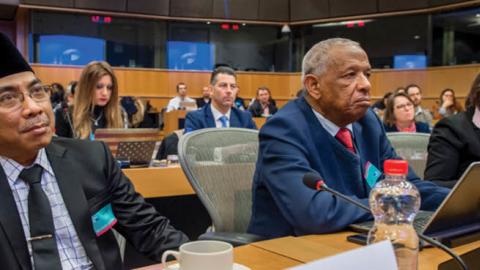While many Americans still classify polities in terms of a simplistic liberal or non-liberal binary, other democratic forces in the world are seeking to reach agreement, accommodation, and cooperation across differing beliefs.
One striking example was the recent meeting of the Centrist Democrat International (CDI) held in Yogyakarta, Indonesia. The CDI is the largest grouping of political parties in the world, having 94 member parties from 73 countries.
The CDI’s earlier incarnation was as the Christian Democrat International, a grouping founded in 1961 of Christian Democratic parties principally drawn from Europe and Latin America. It was established as a centrist or center-right alternative to the Socialist International and more conservative forces. Probably its most influential member is the German Christian Democratic Union, headed by Angela Merkel. The CDI’s European division is the European People’s Party (EPP), currently the largest political party in the European Parliament. The equivalent in Latin America is the Christian Democrat Organization of America. The Democratic Party in the US maintains links with CDI through the National Democratic Institute for International Affairs.
While the International was originally formed to study and enact Christian principles in politics, it attracted support from groups that were not Christian, so rechristened itself as “centrist.” The vast majority of its members are still in the Christian Democrat camp, but it now has member parties from Algeria, Cambodia, Morocco, Senegal, and other countries. One recent addition to full membership in November 2018 was the National Awakening Party (PKB) from Indonesia.
Founded in 1999, the PKB is often described as an Islamic party, which is true but misleading. It is perhaps better described as a nationalist Muslim party that promotes inclusive and nationalist principles and upholds Indonesia’s official state ideology of Pancasila. It has strong, if informal, connections to the traditionalist Nahdlatul Ulama, Indonesia’s and the world’s largest Muslim organization. Its point person on relations with the CDI has been K.H. Yahya Cholil Staquf, general secretary of Nahdlatul Ulama and a member of Indonesia’s Presidential Advisory Council. I have written previously about him in Providence.
Staquf continues to mince no words on the problems of terrorism in relation to Islam. Speaking on February 1, 2019, at a European Parliament joint meeting on “Innovative Approaches to Preventing and Countering Violent Extremism,” Staquf stated :
Islamist radicalism and terror continue to exert a strong appeal to many Muslims, because of the fact that these are directly linked to obsolete and problematic tenets within classical Islamic law (fiqh, often conflated with shari‘ah), which Muslims generally regard as an authoritative source of religious guidance.
He urged his audience to “engage in frank discourse about these problematic tenets of Islamic orthodoxy, while encouraging Muslim religious authorities and Middle East governments to boldly acknowledge and reform them.” In other meetings, he has criticized Western governments’ tendency to ignore and even deny the obvious theological roots of violent and non-violent Islamist extremism.
It is heartening to hear these words directed at senior European Union figures by one of the Muslim world’s most influential leaders. It is also heartening that the CDI decided to hold a board meeting in Indonesia on January 23 of this year.
The CDI’s communique from that meeting stressed the context of “the rise of China and a long-term shift of the world economy’s center of gravity from the North Atlantic to Eurasia” and the dangers of “the emergence of authoritarian, civilizationist states that do not accept the rules-based post-WWII order, whether in terms of human rights, rule of law, democracy or respect for international borders and the sovereignty of other nations.”
In response to these trends, the communique “highlights a common set of humane and universal values, rooted in their respective religious and cultural traditions. These traditions—which include but are not limited to Western humanism, Christian democracy and Humanitarian Islam—may serve as the foundation for a 21st century alliance.”
Another striking feature of the conclave was the attendance of Hungarian Prime Minister Victor Orbán, frequently criticized for being authoritarian and limiting democracy in that country, and for his insistence that Hungary is a Christian country and that he intends to preserve its Christian heritage.1
The Islamic-oriented newspaper Republika headlined its story on the meetings as “Orban opens door for cooperation with moderate Islamic parties.” It quoted him as saying, “We are among those who believe that one’s identity is of paramount importance, and we insist on our national and religious beliefs.” Orbán also said his visits to Indonesia have been “very inspiring,” and he continued:
I became interested in what it means in political philosophy to be Muslim and not Christian. It is very instructive and interesting to see how an Islamic movement presents itself on the political scene. The question is what the future holds for Christianity and for Islam. Can we live on side by side as we used to?
It remains to be seen how far this will develop, but Christian and Muslim politicians and leaders reaching out to each other is one of the more hopeful signs in our increasingly divided world.
Read in Religion Unplugged















